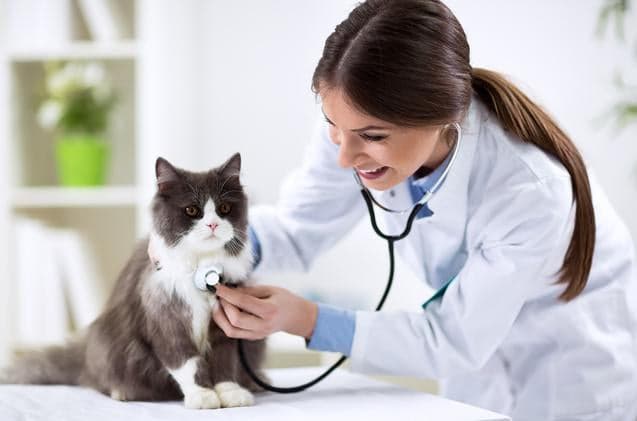As we look at the news today, the Coronavirus Disease, commonly called COVID-19, is dominating the headlines. This virus, which likely originated in bats, has been able to spread to people and thrive, spreading to almost all countries around the world.
There is a large amount of fear of how the disease is spreading and contracting the disease itself. This fear is even sometimes translated into concern for our pets as a dog in Hong Kong tested ‘weakly positive’ for the virus via nasal swab. So, should we be worried about our family pets?
Can our cats catch and spread COVID-19?
Simply put, at this time we should NOT be worried about our pets getting or transmitting the virus. The dog in question in Hong Kong never displayed signs or symptoms, and likely either ingested or inhaled the virus while trying to give its owner support during their time of illness, as our pets do. While there are multiple coronaviruses (a coronavirus is a family of viruses, some of which can affect cats with diseases like Feline Infectious Peritonitis), these viruses are mostly species-specific, and only jump between species in certain rare situations. This is because successful interspecies transmission of a virus depends on the viral genome acquiring mutations that make it more likely to survive and thrive in a new species. As mutations occur randomly and accumulate gradually, acquiring the exact set of mutations that will allow COVID-19 to thrive in your cat during one transmission event (from you to your cat) is highly unlikely. There is a substantial amount of sources releasing reasons not to be worried about COVID-19 transmission between you and your cat, including Dr. Ernie Ward, Trupanion, and AnimalBiome.
As you may have seen, the Ministry of Health in Belgium has recently announced that a cat was exhibiting respiratory and gastrointestinal signs roughly one week after their owner was diagnosed with COVID-19. The Faculty of Veterinary Medicine at the University of Liege found that the viral RNA of the virus was detected through PCR testing in both the feces and the vomitus of the cat.
While this initially sounds concerning, there is still a lot of information around the case that remains to be seen. According to the AVMA, we don’t currently have the full clinical picture around the cat, and whether or not the cat was experiencing the symptoms due to other diseases. At this time, there continues to be no confirmed report of clinical disease in cats caused by COVID, though research will continue as we track the human cases around the world.
It is important to remember that there is no evidence that pets can become infected with the disease and pass it to other pets or humans. Please remember that if you do become infected or need to self-isolate due to exposure to COVID-19, please continue to follow the CDC guidelines to best protect yourself and your pets! For continued and constantly updated information about coronavirus and cats, visit our Covid Hub page.
What diseases can you get from your cat?
When we talk about diseases humans can get from animals, we first have to talk about the language. These are called zoonotic diseases, which comes from the Greek words zoo (meaning animals) and nosus (meaning disease). These include Rabies, Rocky Mountain Spotted Fever, Plague (like the Black Plague!), Ringworm, and other parasites. All these diseases are preventable through a few steps and good health management for our little hunters, particularly those that spend a large amount of time outside and are susceptible to coming into contact with wildlife.
The best layer of protection is through vaccination, if possible. We have vaccines for Rabies, and those cats that spend unsupervised time outdoors should always be kept up-to-date to prevent any transmission from an animal like a bat. The list of zoonotic diseases that use fleas as part of their transmission life cycle is numerous, and include tapeworms, Typhus, and Plague. As you can see, making sure that you exercise adequate flea control for your cat through a good flea preventative is crucial to maintaining a happy, healthy home for you and your cat. As you spend more time at home and with your cat, consider how you can stay on top of their health by knowing more about them genetically through their Basepaws DNA report. Lastly, have a yearly veterinary visit.
As many people have felt, the new Coronavirus Disease has caused ripples through the world of travel, business, society, and how we view our pet’s potential diseases. While the new Coronavirus Disease currently presents no cause for concern from a pet standpoint, it is important to protect ourselves and our cats from those diseases that are already much closer to home. We know that both Coronavirus Disease and Zoonotic Diseases can be extremely scary topics. Send us questions at meow@basepaws.com with the tagline ‘Virus Questions’ and we’ll answer them in a later blog.



